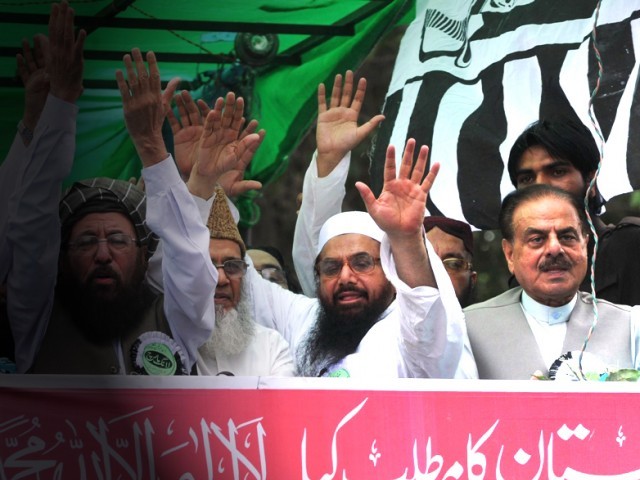The case for selective nationalism and Jihad -by Abdul Samad

Nationalism works in unique ways in Pakistan. For the greater good, in the larger interest of the nation, certain contentious issues are kept out of the public sphere, are pushed towards neglect and indifference.
The country and its territorial sovereignty, it is argued, trumps all moral considerations, any perceived transgression of the law as ordained in the constitution, any squashing of fundamental human rights. We seek solace in our unity, in our continued existence as a sovereign nation state. Logic and conscience and morality are sacrificed at the altar of nationalism, or what I would term as “selective nationalism”, the usage of the concept in accordance with the state narrative and dominant ideology. Needless to say, jingoistic nationalism constitutes a grave threat, for it shrink-wraps the mind into a narrow and bigoted state of thinking.
Besides this, there is another unique phenomenon in our society: the case of selective Jihad, which is even more intriguing. Consider the case of Chinese Muslims under the oppression of a regime that constrains their religious practice, stifles free speech and resorts to violence as a tool of maintaining a coercive social order.
The support for the freedom of the Kashmiris is a Jihad (rightly so), the killing of Burmese Muslims stirs passion and evokes condemnation; however, the state repression in China does not qualify any official response, primarily because China is an all-weather friend, a strategic geo-political partner and a rising economic superpower.
National interest trumps morality.
The hypocrisy is palpable, but much worse is the absolute complicity of the state apparatus in Pakistan, in conjunction with the media and certain elements of the religious clergy, in keeping a tight lid on the matter. Put simply, the establishment does not find it in its interest to raise this as a national concern. One may argue that the entire Muslim world remains indifferent to the plight of their brothers in China, but then one would have to consider the special “bond of friendship” that exists between Pakistan and China, and how Pakistan, as a strategic ally, can(and morally should) raise the treatment of Muslims in the ensuing bilateral dialogue.
And while we are at it, let me make this clear: China is not an all-weather friend of Pakistan (anyone briefly acquainted with the working of international relations and the power realist theory would attest to this); the country, like any other(think of the United States), has vital strategic interests-exploration of oil and gas, mining of copper and minerals, and access to the deep sea Gwadar Port-and has and will continue to pursue its national interest, while promoting and encouraging the rhetoric of China-Pakistan’s unyielding and unwavering friendship.
Considered from the Chinese perspective, the large, resource rich and thinly populated region of Xinjang, remains susceptible to the spread of radical Islam, which would constitute the worst case scenario for a country yearning for internal cohesion as it progressively ascends the economic ladder. Pakistan, for its part, as postulated in official statements, remains committed to eradicating terrorism and maintaining China’s national sovereignty and core interests.
Many in Pakistan, owing to a state sanctioned blackout, remain absolutely unaware of the developments in East Turkestan, which is home to the Muslim Uighur Turks. Consider the statement of Dilxat Raxit, the spokesman for the Munich-based World Uighur Congress “If any religious figure discusses Ramadan during the course of religious activities, or encourages people to take part, then they will lose their license to practice”. Torture, executions, labor camps and religious oppression have been salient features of life in East Turkestan. China’s assimilationist policies have prevented the majority Muslim population of East Turkestan from basic freedoms: speaking their own language and adopting their culture, from going on the hajj, performing daily ritual prayers, fasting, and even, most egregiously, determining their family size. The degree to which the state intrudes into the private domain can be gauged from an excerpt from an online blog” For example, the Chinese government dictates who can and cannot enter a Mosque. The following are barred from entering a mosque: women, anyone under the age of 18, state employees, workers and retirees, and communist party members”.
Walter Russell Mead, in an article in the American Interest, elucidates how the Chinese state treats its Muslim minority population:
Last year, the authorities started forcing low-income families to agree to abandon some Muslim traditions in exchange for social security payments. Forms posted on the internet show that some women signed a pledge not to wear the veil and not to receive veil-wearing guests in their homes, in exchange for receiving low-income subsidies for their families.
One middle school in Aksu, a city on the northern rim of the Taklamakan desert which has seen deadly sectarian violence in recent years, said it would step up propaganda for national unity and against “ethnic splittism” and ensure that “no teachers or students attend any religious activities “during Ramadan.
The model of Jihad ascribed by the Pakistani Taliban (and other radical groups) is patently un-Islamic and even as Tariq Ramadan advocates, anti-Islamic. The struggle for the rights of the Uighurs should instead be an intellectual and non-violent movement. Pakistan should put diplomatic pressure on China to address the legitimate concerns of the minority Muslim community (the right of freedom of worship) in order to reach an amicable solution to a potentially
perilous situation.
